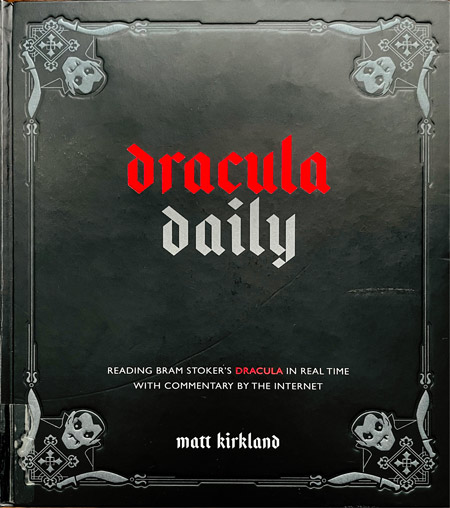Dracula, bite-sized
How KU alumnus Matt Kirkland created an internet sensation, and put a modern twist on Bram Stoker’s Gothic tale.

Imagine you discovered a novel you really liked, started a book club to share it with others, and more than 250,000 people showed up.
That’s pretty much what happened to Matt Kirkland when he created Dracula Daily, an email newsletter that breaks Bram Stoker’s classic vampire novel into sections that each encompass a single day of action.
Because Dracula is an epistolary novel, told through diary entries, letters, telegrams and newspapers, every scene is pegged to a date. The story starts May 3 and ends Nov. 6. Kirkland figured that by delivering each passage to inboxes on the day of the year it takes place in the novel, Dracula Daily could provide participants with a new way of reading the 125-year-old classic. And they’d do it as a group.
“I was reading it in 2020, and that was the summer of not going places,” says Kirkland, f’04, a web designer and co-founder of Brand New Box, a Lawrence design studio. “We were all missing human connection, so reading it together with a bunch of people sounded really appealing.”
What Kirkland had no way of knowing was just how big that bunch would get—and how idiosyncratic would be their take.
In 2021, when Dracula Daily launched, about 1,500 people signed up to receive emails. Some passages spanned chapters; some were only a few sentences. Sometimes weeks passed without an email when nothing was happening in the book.
The project was originally intended as a one-off, but as May 2022 approached, Kirkland was surprised to see sign-ups had doubled. He decided to send out Dracula Daily a second time.
As the May 3 launch approached, a funny thing happened to his passion project, which Kirkland self-deprecatingly describes as part of his “bad habit of making silly side projects for the internet.”
It went viral.
“I was sitting in a baseball game refreshing the numbers because it was going from 10,000 to 20,000 to 30,000 to 40,000,” Kirkland recalls. “It was like, ‘I think this thing’s going to cross 100,000 people before the seventh inning.’ It was hard to pay attention to the baseball game.”
Ultimately, 200,000 people joined the readalong that year, and more than 250,000 signed up in 2023. Readers took to Tumblr, Twitter and other websites to post memes, comics, snarky commentary, original artwork and thoughtful takes “half a term paper long,” says Kirkland, who was “entirely delighted” by the outpouring. At one point, his humble project was getting more play on Tumblr than the new Marvel movie.
“The whole thing was shocking and just super fun,” he says. “Seeing all the ways people embraced it and responded—it was like this big water-cooler moment.”
As he printed out screenshots to save his favorite commentaries, Kirkland hit on another idea: Why not publish a book that featured not only his “lightly remixed adaptation” of Dracula (because Stoker’s novel is not entirely chronological, Kirkland had to do some minor rearranging to put the text in strict linear order), but also a sampling of reader responses.

Dracula Daily: Reading Bram Stoker’s Dracula in Real Time With Commentary by the Internet, published by Andrews McMeel last fall, is a striking embossed hardcover that sprinkles dozens of written and visual-art responses from Dracula Daily participants throughout the text as marginalia. The book was launched during Lawrence Public Library’s Booktoberfest, the annual community reading event that distributes a selected title and holds public events encouraging discussion of the book’s themes. The 2023 selection was Dracula.
In his talk, Kirkland, a voracious reader, said the Dracula Daily phenomenon made the typical book experience feel like binge watching. “Oh, you’ve dropped the whole season on me in one copy?” he joked.
On the other hand, spreading Dracula over seven months—by subscribing to the newsletter on the Dracula Daily website or by using a little self-discipline and “the innovative technology of a ribbon bookmark” with the print version—is an entirely different reading experience.
“I think having that interrupted, slow, spaced-out cadence gives us a new way to think about the book,” Kirkland says. “You feel a little more suspense. It’s a fun way to live through this.”
Steven Hill is associate editor of Kansas Alumni magazine.
Photo by Steve Puppe
/




